Meet Augustas Blinstrubas – a first-year Aviation Management student at Kazimieras Simonavičius University (KSU). Though he completed school in Luxembourg, his heart was always in Lithuania. 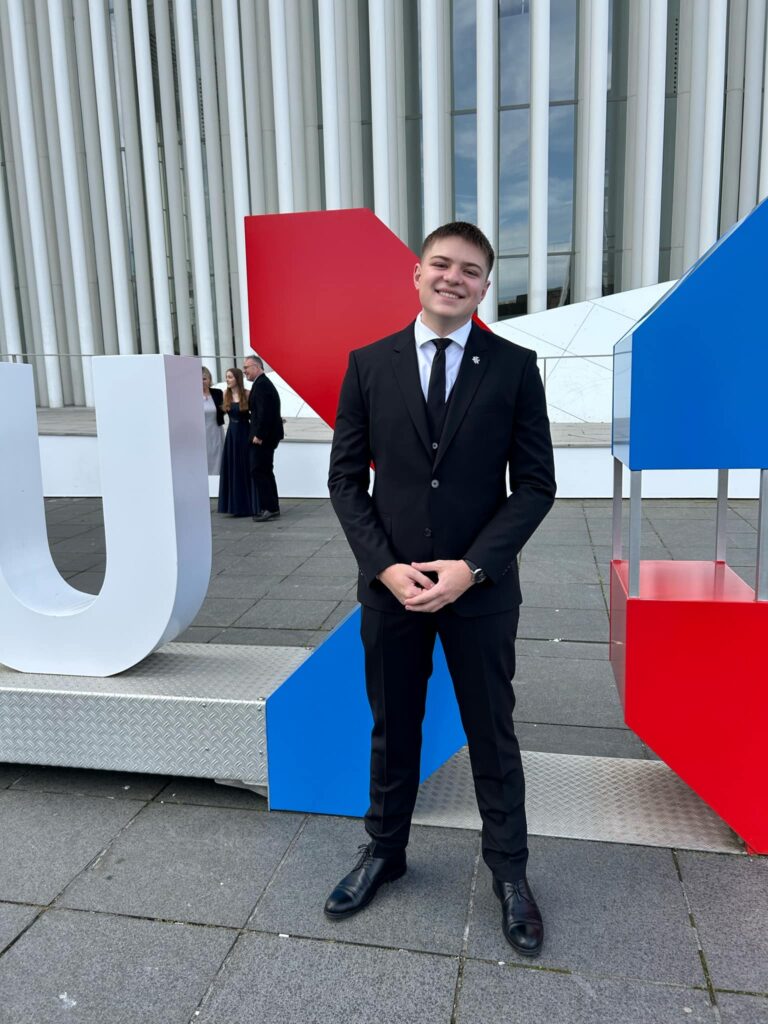
“Even though I did well in Luxembourg – I was active in sports and involved in various activities – I always knew I would study in Lithuania. I wanted to be closer to my friends and grandparents. Lithuania is home,” says Augustas.
A Unique Path Rooted in Purpose
Augustas’ journey has been anything but ordinary. While still a student abroad, he co-founded a Foreign Riflemen Squad with his father – a group that brought together like-minded individuals to actively support Ukraine during the war.
“The war in Ukraine deeply affected me. I realised I couldn’t stand by. Many people joined us – people who wanted to help,” he explains.
Driven by a strong sense of meaning and purpose, Augustas looks for value in every aspect of life – from his studies to his relationships.
Inspired by Family and Discipline
With a father who served as an officer and a mother who worked in the fire service, Augustas grew up surrounded by examples of service and strength.
“Their example taught me what discipline and responsibility really mean,” he shares.
Although he once considered joining the Military Academy, his father and friends encouraged him to explore broader options. That led him to aviation studies – a field still connected to his dream of becoming a pilot but with more diverse career opportunities.
Why KSU?
Augustas discovered Kazimieras Simonavičius University through friends, and was drawn in by the study programme, the international faculty, and the collaborative culture.
“The lecturers are true professionals – many are international. They explain everything clearly and are always supportive. There’s no situation they can’t help you understand.”
He highlights dr. Konstantinos Kalegiannis, a lecturer from Greece, as a standout:
“He knows how to spark interest and get to the heart of the topic. A truly inspiring lecturer.”
Life Beyond the Lecture Hall
Augustas is a multi-talented student. In his free time, he draws, writes, and trains in martial arts.
“I’ve promised myself to attend martial arts training for a year – we’ll see if I enjoy it.”
He’s also committed to personal growth and self-discipline. He recalls how social media once distracted him from his goals, especially during exam season:
“Now I leave my phone in another room at night. I deleted what I didn’t need. I read more, do more – and honestly, I haven’t lost anything.”
Supportive Parents and Future Plans
Augustas is grateful for his parents’ guidance – supportive, but never pushy.
“My dad told me: ‘Do what’s important to you.’ That gave me freedom – and a sense of responsibility.”
He plans to enrol in Junior Officer Commanders’ Training next year to continue challenging himself and expanding his knowledge.
“Being an officer means there’s no room for serious mistakes. You’re responsible, and you need broad knowledge – because you never know what life will demand.”
Advice for Those Still Deciding
To those still unsure about their path, Augustas offers simple but powerful advice:
“Choose what you enjoy. Only then will the path feel real – and you’ll move along it faster.”
What fuels conflict—from power struggles to fear and inequality? Join us for an open lecture “The Anatomy of Conflict: Understanding Its Causes and Escalation” with Dr. Mehmet Recai Uygur, an expert in conflict studies and political theory. 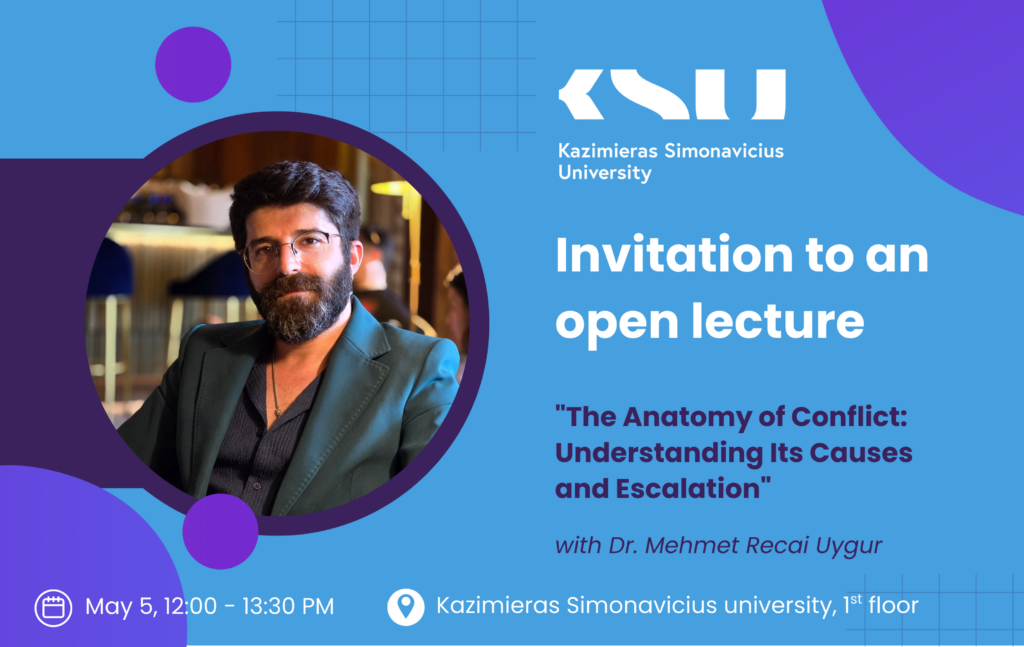
From Cold War politics to current global crises, we’ll explore why tensions erupt—and how they spiral.
A multidisciplinary look at power, cooperation, trauma, and injustice through the lens of four major conflict theories.
Save date and time: May 5, 12:00 – 13:30 pm. | Open to all curious minds.
Location: Kazimieras Simonavicius university, Dariaus ir Girėno g. 21, Vilnius.
If you have any questions, contact: jurgita.valatkeviciute@ksu.lt
Ready to turn your ideas into reality? Then this is your time! 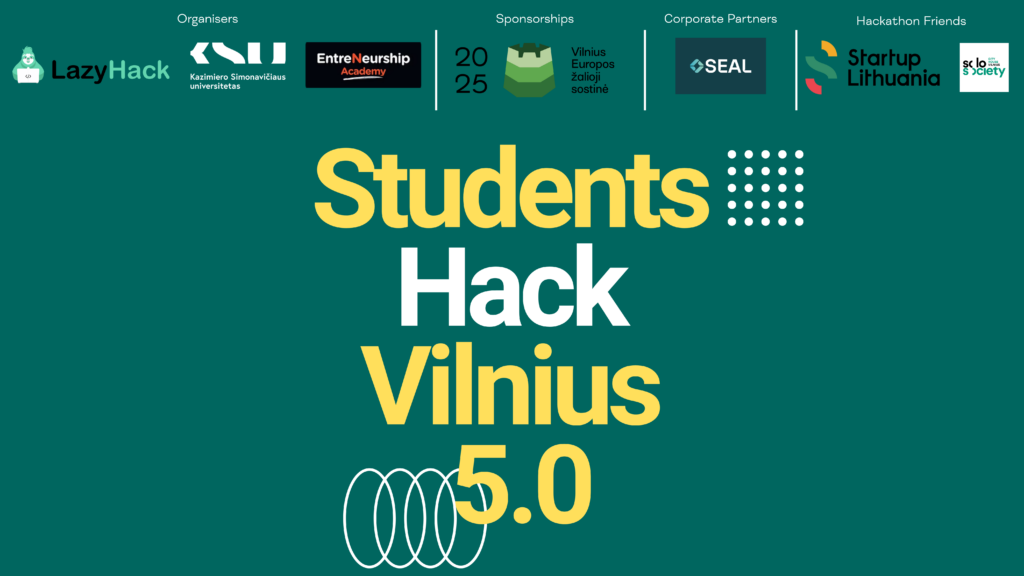
KSU university, together with Lazy Hack and the EntreNeurship Academy, invites all students from Lithuanian higher education institutions who are passionate about innovation and entrepreneurship to join Hack Vilnius 5.0!
Date: 17th May 2025
Location: Solo Society City House Vilnius (Šv. Stepono g. 33)
Time: 8:30 a.m. – 8:00 p.m.
This year’s challenge:
Innovating for a Sustainable & Green Economy
– Topics:
– Sustainable Aviation
– Green Fashion
– Smart & Sustainable Cities
– Open Innovation (Wildcard Track)
Spots are limited – register now!
https://www.lazyhack.io/students-hack-vilnius-5-0
Mindaugas Latišenka has joined KSU University as the new institutional Erasmus+ programme coordinator, bringing with him 13 years of experience in the field. He succeeds Kristina Šlekienė, who will now be responsible for welcoming international students to the university.
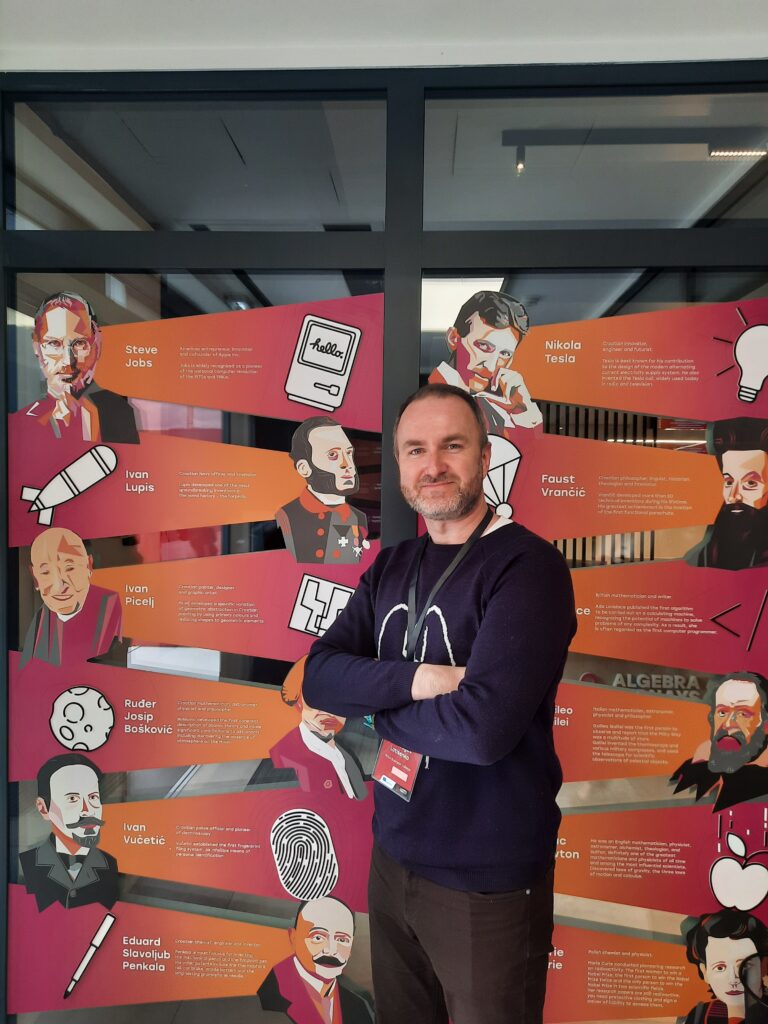 We asked Mindaugas a few quick questions to help the KSU community get to know him better.
We asked Mindaugas a few quick questions to help the KSU community get to know him better.
– Could you briefly introduce yourself?
– I’m a 35-year-old from Vilnius. I was born and raised here, and I love this city more than ever.
– Complete the sentence: “I’m great because…”
– …I’m almost amazing—just a little bit more to go, but I’m on the way.
– What motivates you to get out of bed in the morning?
– The thought that, through my work, I might make the world just a little bit better.
– How do you deal with your shortcomings—if you have any?
– I accept them and try to focus more on my strengths.
– Who or what inspires you?
– Sir Ken Robinson, who encouraged people not to fear mistakes, to ignore others’ judgments, and to simply give things a try.
If I were a song, I’d be “One Day” by Asaf Avidan and the Mojos.
– How do you like to spend your free time?
– Travelling, running, listening to basketball podcasts, taking part in pub quizzes, watching alternative documentaries, and indulging in sweets.
– How many countries have you visited?
– 38 so far—and many of them thanks to the Erasmus+ programme.
– Do you enjoy your job?
– Absolutely!
– How would you describe the Erasmus+ programme in one sentence?
– It’s an incredible opportunity to discover yourself, grow, change your environment, and meet friends—or future business partners—from around the world—and all of it free of charge.
– Why should students take part in the Erasmus+ programme?
– According to a study by the European Commission, students who participate in Erasmus+ are up to 80% more attractive to employers across Europe than those who don’t.
– What would you like to wish our students?
– Don’t be afraid to be original, express yourselves, and make the most of the opportunities KSU has to offer.
Professor Eugenijus Skerstonas, a distinguished academic at Kazimieras Simonavičius University and Doctor of Social Sciences, stands out as one of Lithuania’s leading cultural and intellectual figures. He is widely recognised for his work on the culture of appearance, style, aesthetics, and lifestyle, having authored numerous scholarly and popular albums. In recognition of his contribution to culture, Professor Skerstonas was awarded the Order of Arts and Letters by the Republic of France. 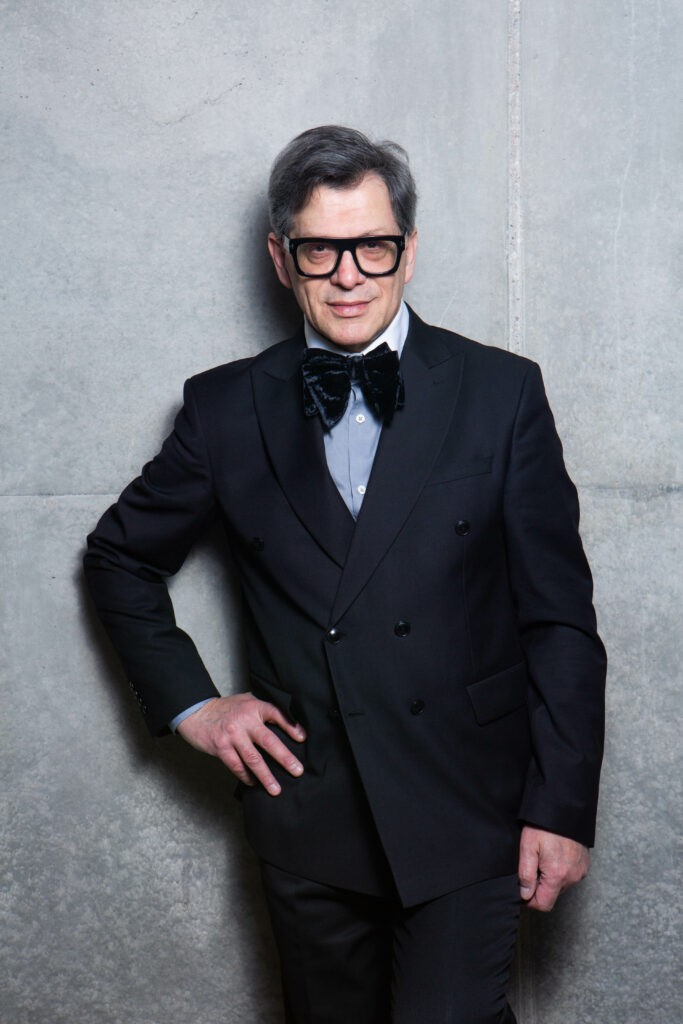
At this year’s Vilnius Book Fair, he presented his latest work — a trilingual, three-volume edition entitled Private Vilnius: Lives of Interiors. This commemorative publication, marking the 700th anniversary of Vilnius, invites readers to explore the capital’s identity through the lens of private interior aesthetics and cultural narratives. It is available in Lithuanian, English, and Polish.
We spoke to the professor about the origins of this unique project, created in collaboration with photographer Augis Narmontas, and what readers can expect to discover within its pages.
– How did this ambitious and expansive project come about?
– My intention was to showcase the rich diversity of Vilnius’s private residential interiors and their distinctive ornamentation. I sought to document what often remains hidden — private spaces that reflect our culture, traditions, and varying interpretations of aesthetic value.
– The interiors featured are not stylised or staged for photography. Why did you choose a documentary approach?
– It was important for me to capture these living spaces exactly as they were on the day of the shoot. This three-volume work is a form of visual documentation, offering an authentic portrayal of how Vilnius residents live and express their aesthetic preferences. We photographed the interiors in the way their owners had envisioned and decorated them.
– In your view, how does interior decoration reflect a person’s character?
– A home is a reflection of our lifestyle culture — a metaphor rooted in reality. As I’ve often said, interiors serve two main functions: one practical, the other aesthetic. Each individual interprets their environment differently, so interiors become not just physical spaces, but a means of self-expression. They reveal artistic intuition or awareness, cultural background, and even a person’s worldview and emotional landscape.
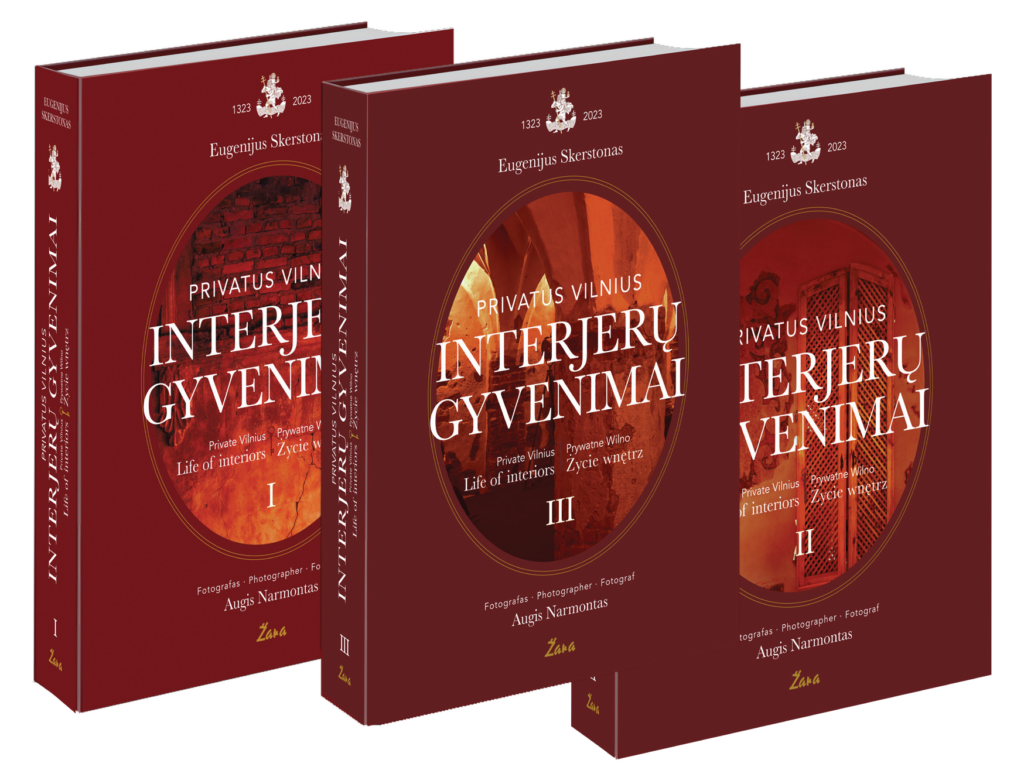 – Your publication is available in Lithuanian, English, and Polish. Was it your aim to reach an international audience?
– Your publication is available in Lithuanian, English, and Polish. Was it your aim to reach an international audience?
– Absolutely. Vilnius is a cosmopolitan city with deep historical ties to many cultures. I wanted the book to be accessible not only to Lithuanians but also to international readers interested in the city’s history, architecture, and interior design heritage.
– What kinds of interiors can readers expect to find in these volumes? Could the book also be seen as part of Vilnius’s historical narrative?
– The interiors presented include both contemporary private homes and those that bear witness to the past — sometimes a very distant one. Many spaces have been substantially altered by previous owners, but we also found places where, quite remarkably, original elements have survived. Without doubt, interiors form an essential part of Vilnius’s history. They evoke images of past lives and lived experiences within these walls.
– How have Vilnius’s residential interiors evolved over time, in your opinion?
– The passage of time has had a profound impact on interior decoration. Every era brought new owners who reimagined their intimate environments. Today, interior researchers attempt to trace the dominant trends of the past, identifying key stylistic characteristics. For instance, Gothic and Baroque Vilnius had its own aesthetic sensibilities, which changed dramatically during the Soviet period. Since Lithuania regained independence, we’ve seen a shift towards European influences. In recent years, there has been a stronger emphasis on individuality — people are rethinking what luxury means, yet still seeking comfort, and blending it with function and a personal sense of beauty.
– As both a Doctor of Social Sciences and a lifestyle culture expert, how do you see this field connecting with interior design?
– Thank you for the thoughtful observation. Lifestyle culture touches on many areas related to spirituality and imagination, including how we shape our living spaces. An interior is not just furniture and colour schemes — it influences our mood, reflects our daily culture, and can even shape our worldview. I believe it’s essential to discuss how aesthetics, function, and personal space can contribute to human well-being. Just take a look at the stunning photographs that capture the authentic quality of life in Vilnius.
– Where can readers find your new three-volume publication?
– The album Private Vilnius: Lives of Interiors was released during the anniversary year and is now available in libraries, major online bookshops, and on the Žara publishing house website.
In 2023, Kazimieras Simonavičius University (KSU) proudly celebrated its 20th anniversary. Over two decades, KSU has built a strong reputation for offering forward-thinking, market-relevant study programmes. Among the university’s most recognized offerings are the Aviation Management and Fashion Industry programmes—both designed to prepare students for dynamic and international careers. According to the 2024 rankings by Reitingai magazine, KSU holds second place among the strongest private universities in Lithuania.
One of the key strengths of KSU lies in its flexible and student-centered approach to learning. Recognizing the needs of modern learners, the university offers various study formats in addition to the traditional full-time model. Lectures are held in the evenings, on weekends, or delivered remotely and in hybrid formats, allowing students to successfully balance their studies with work, family life, and personal pursuits.
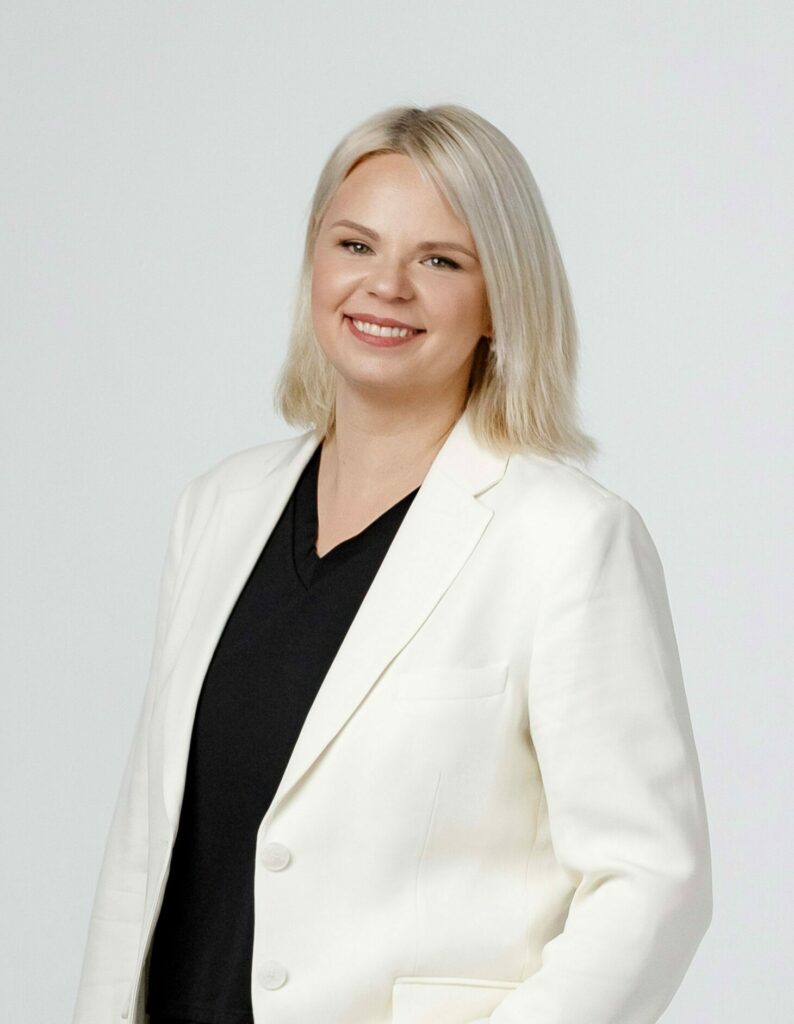 Associate Professor Dr. Lidija Kraujalienė, Vice-Rector for Studies, emphasizes that KSU attracts ambitious and active students. The university is committed to helping each student find an individual path, enabling them to integrate their academic goals with career development and lifestyle needs.
Associate Professor Dr. Lidija Kraujalienė, Vice-Rector for Studies, emphasizes that KSU attracts ambitious and active students. The university is committed to helping each student find an individual path, enabling them to integrate their academic goals with career development and lifestyle needs.
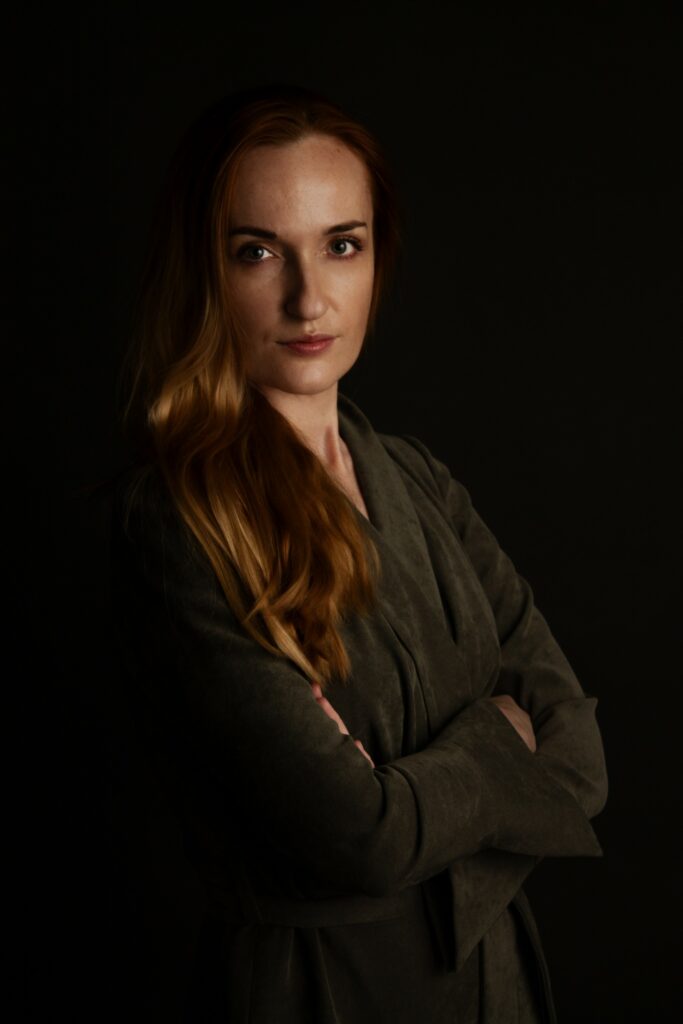 Lada Oleškevičienė, a Master’s student in Aviation Management and currently Head of Commercial Operations at Nordic Aircraft Systems, highlights how KSU’s flexibility supports working professionals. She notes that lectures usually begin after 6 PM, making it easy to attend after work. Moreover, all sessions are recorded, providing the option to revisit or catch up on material at a convenient time. According to her, the supportive atmosphere created by both lecturers and university staff ensures a smooth and enriching study experience.
Lada Oleškevičienė, a Master’s student in Aviation Management and currently Head of Commercial Operations at Nordic Aircraft Systems, highlights how KSU’s flexibility supports working professionals. She notes that lectures usually begin after 6 PM, making it easy to attend after work. Moreover, all sessions are recorded, providing the option to revisit or catch up on material at a convenient time. According to her, the supportive atmosphere created by both lecturers and university staff ensures a smooth and enriching study experience.
Aviation Management at KSU has become an increasingly popular field of study, attracting students interested in the global aviation industry and its long-term career prospects. Although aviation is sometimes seen as a niche sector in Lithuania, it plays a vital role in the country’s economy and international presence. Lithuanian-owned aviation companies contribute approximately 1.3 billion euros to the national GDP annually and operate across 25 countries worldwide. The industry employs between 6,000 and 7,000 professionals in areas such as marketing, sales, finance, IT, engineering, project management, law, and human resources.
The Bachelor’s programme in Aviation Management at KSU is one of the most sought-after in Europe and was developed in close collaboration with industry partners and aviation associations. In 2024, the university introduced a Master’s programme in the same field, with a strong emphasis on developing leadership and strategic management competencies. Visiting lecturer Dr. Anil Padhra, an aviation expert from the United Kingdom, praises the programme for aligning with international standards and preparing graduates to lead in the dynamic global aviation sector.
Equally distinctive is KSU’s Fashion Industry programme—currently the only undergraduate programme of its kind in Lithuania. Launched a decade ago, the programme was recently accredited for seven years by the Centre for Quality Assessment in Higher Education, a testament to its quality and maturity on the international stage. The curriculum includes unique subjects rarely offered even at European universities, such as fashion psychology, culture of appearance, and costume history. Professor Dr. Eugenijus Skerstonas notes that even students who return from study exchanges in Italy or other countries often speak highly of the programme’s originality and depth.
The global fashion industry has been expanding rapidly, growing by 25 percent since 2020 and reaching over two trillion US dollars in 2023. Projections suggest this figure could rise to three trillion by 2027. As issues like sustainability, transparency, ethics, and digital transformation become more important, there is a growing demand for well-rounded professionals who understand both the creative and strategic sides of fashion.
In addition to its academic offerings, KSU also hosts the Fashion Academy—a creative platform for young people and fashion enthusiasts. Launched in collaboration with KSU alumna and fashion journalist Greta Kukštaitė, the Academy has already seen its second graduating class and continues to attract emerging talent. Starting in September, the university will expand its portfolio with a new Master’s programme in Fashion Management, designed to prepare graduates for leadership roles in this fast-evolving industry.
For more information about study programmes at KSU please visit: Kazimiero Simonavičiaus universitetas – ksu.lt
At Kazimieras Simonavičius University (KSU), a five-month Lithuanian language course for Ukrainian refugees recently came to an emotional close, highlighting the power of language in rebuilding lives and connecting communities.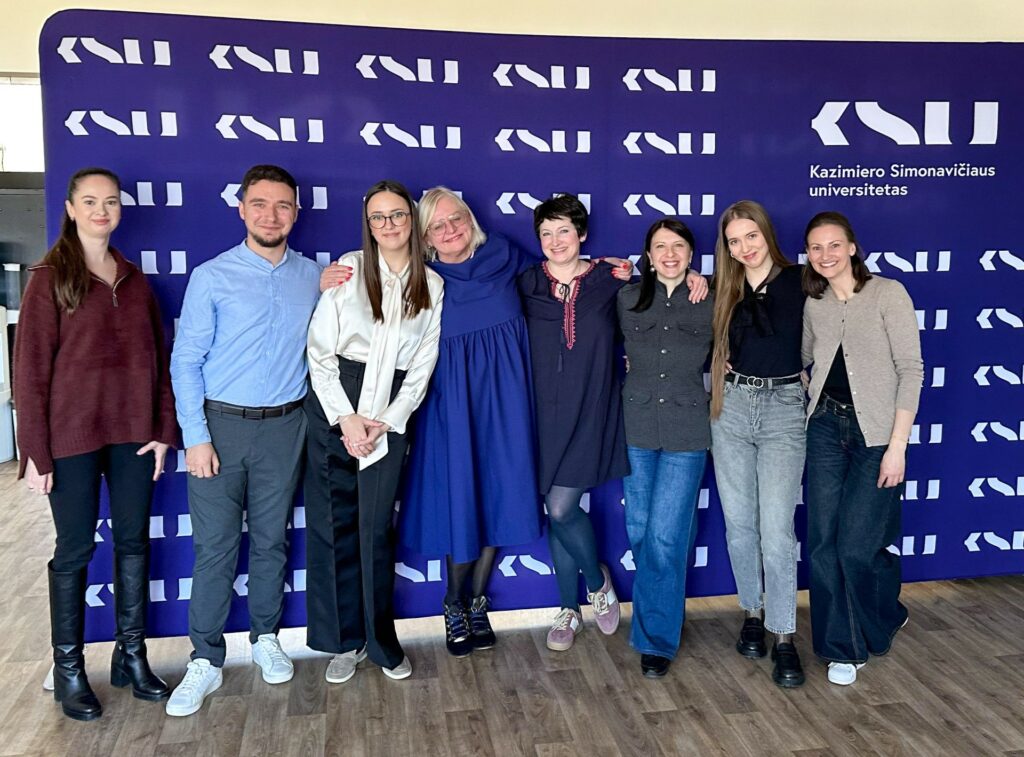
Between 24–27 March, lecturers at KSU led the final sessions of a Lithuanian course specially designed for Ukrainians who fled the war in their homeland. Over 100 participants took part in the programme, funded by the European Economic Area and Norway Grants (2014–2021) through the Bilateral Cooperation Fund.
A Journey of Language and Hope
“From the moment I arrived in Lithuania, I’ve been doing my best to learn the language,” says Sergii, one of the course participants who completed the B2 level.
For Jurgita Valatkevičiūtė, the project’s coordinator, the initiative was more than just a set of classes:
“Our university team feels proud of what we’ve accomplished. These courses gave people more than language – they offered belonging, confidence, and a stronger connection to Lithuania.”
One Goal, Many Backgrounds
The participants came from all walks of life: doctors, teachers, designers, engineers, students, baristas, and retirees. What brought them together was a shared determination to integrate, despite being uprooted by war.
“They all had a common goal – to speak with Lithuanian people,” says Jurgita.
Teaching That Makes a Difference
The course was led by an experienced team of four lecturers:
What made the course unique was the cognitive teaching method developed by Prof. Zabarskaitė. Rather than focusing on grammar from the start, the course encouraged speaking, vocabulary building, and learning through real-life situations.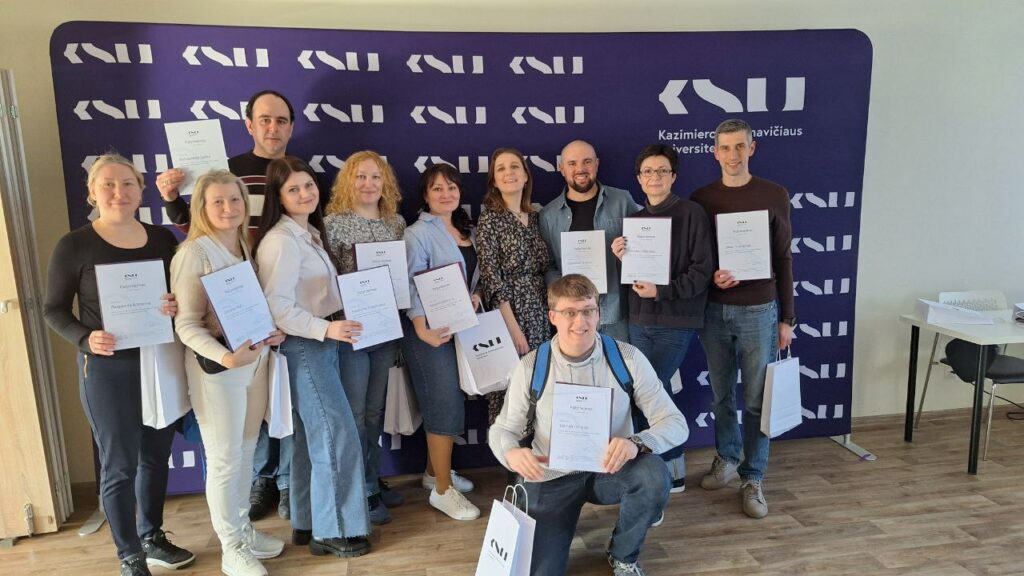
“Mistakes are a natural part of learning. Grammar only comes later,” explains Prof. Zabarskaitė.
“The key is to speak and not be afraid. Over 60% of participants began speaking Lithuanian during the course – not just answering questions, but having real conversations.”
Motivation That Moves Mountains
A big part of the course’s success came from the students’ own motivation.
“Ukrainians really want to learn. For them, it’s not just a skill – it’s a necessity,” says Zabarskaitė.
“That motivation makes all the difference.”
But she also believes Lithuanians play a crucial role in supporting learners:
“We often switch to English or Russian, thinking we’re helping. But we’re actually making it harder. We should be patient and help Ukrainians practise Lithuanian – they truly appreciate the effort.”
Real People, Real Progress
Sergii (25) – Engineer from Kharkiv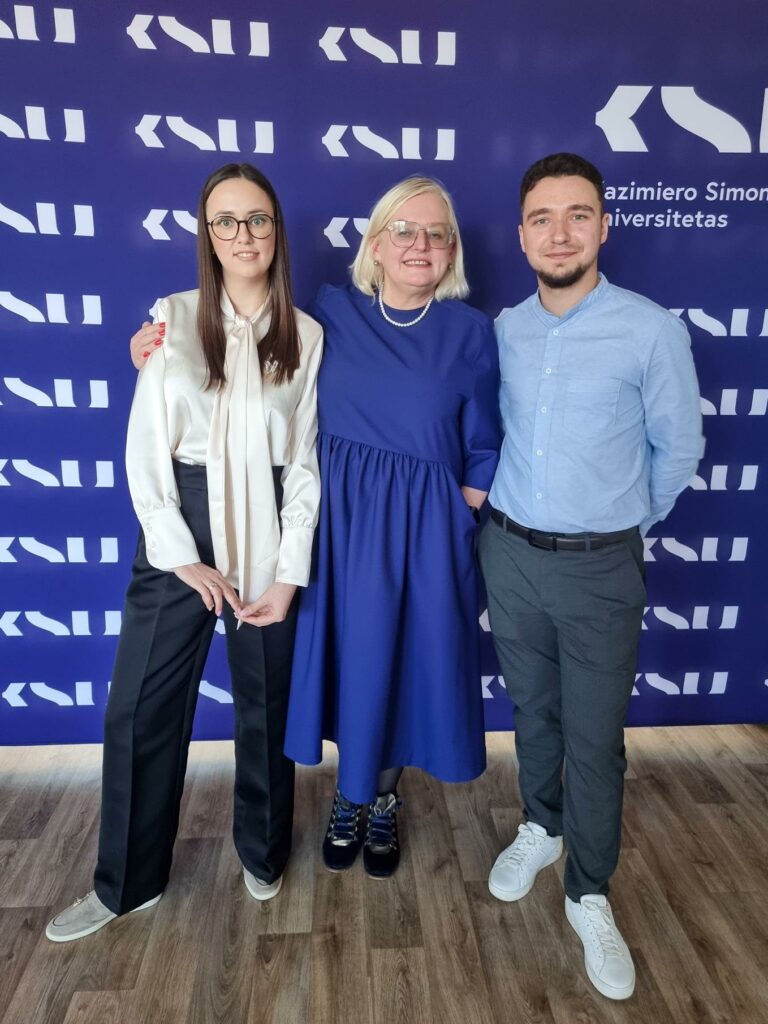
Sergii came to Lithuania three years ago with his wife Ana. Now working as an engineer at a Lithuanian company, he’s completed four different Lithuanian language courses.
“This one was especially helpful – we focused on speaking. Jolanta’s method really helped expand my vocabulary,” he says.
“I plan to take the state language exam. It just feels natural – I don’t understand how someone could live here for 5 or 10 years and not learn the language.”
Eva (21) – Barista from Kyiv
Eva works in a café at the CUP shopping centre. After completing the A1 level, she already feels confident speaking with customers.
“Our teacher, Tatjana, was incredibly warm and supportive. I never felt stressed in her class – it made learning easy,” she says.
“As long as I live in Lithuania, I’ll keep learning.”
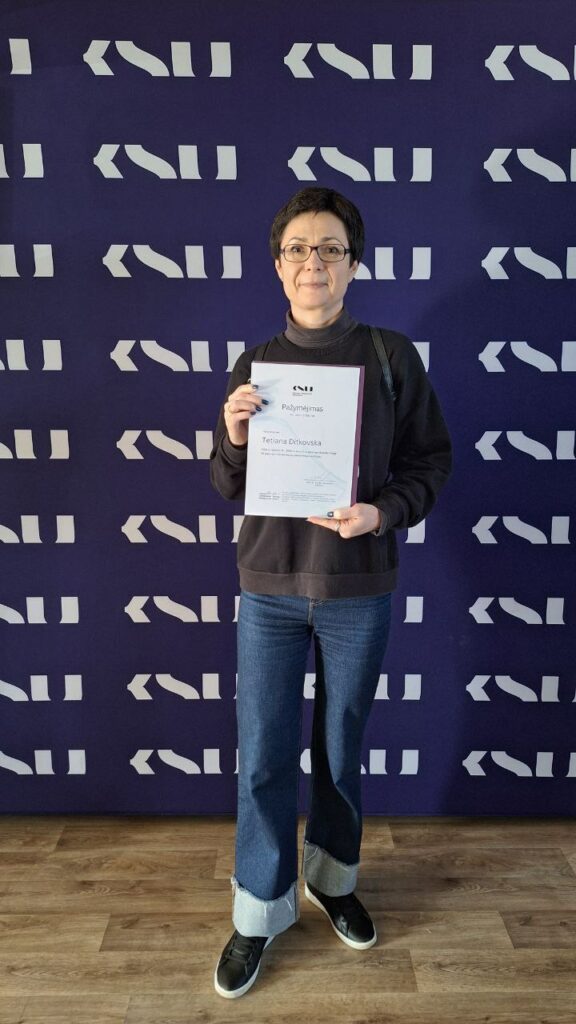 Tetiana (45) – Producer from Ukraine
Tetiana (45) – Producer from Ukraine
Tetiana, a well-known producer back home, had a discouraging start with Lithuanian before joining KSU.
“My first course elsewhere focused only on grammar. I ended up afraid to speak. But at KSU, we learned through songs, texts, and constant conversation. The language finally started to feel approachable,” she recalls.
“And our group became real friends – we’re still in touch.”
A Project That Builds Bridges
Looking back on the experience, project lead Jurgita Valatkevičiūtė says:
“There were plenty of challenges and emotional moments. Often, we had to act not just by the rules, but with empathy. But it was worth it.
We believe language skills will help Ukrainians not just survive here – but truly thrive.”
About the Project
Project Title: Lithuanian Language Training for Ukrainian Refugees Fleeing the War of Russian Aggression
Organiser: Kazimieras Simonavičius University (KSU)
Funding: European Economic Area and Norway Grants (2014–2021), Bilateral Cooperation Fund
As students increasingly seek careers that are not only exciting but globally relevant and future-proof, the aviation industry is taking flight. Once seen as a niche sector, aviation today offers vast career opportunities – both in Lithuania and around the world.
This topic was at the heart of the discussion “Flights of the Future: Demand for Aviation Management Specialists and Career Opportunities,” organised by Kazimieras Simonavičius University (KSU) on 28 March at the “Career & Studies in Lithuania 2025” fair at Litexpo. 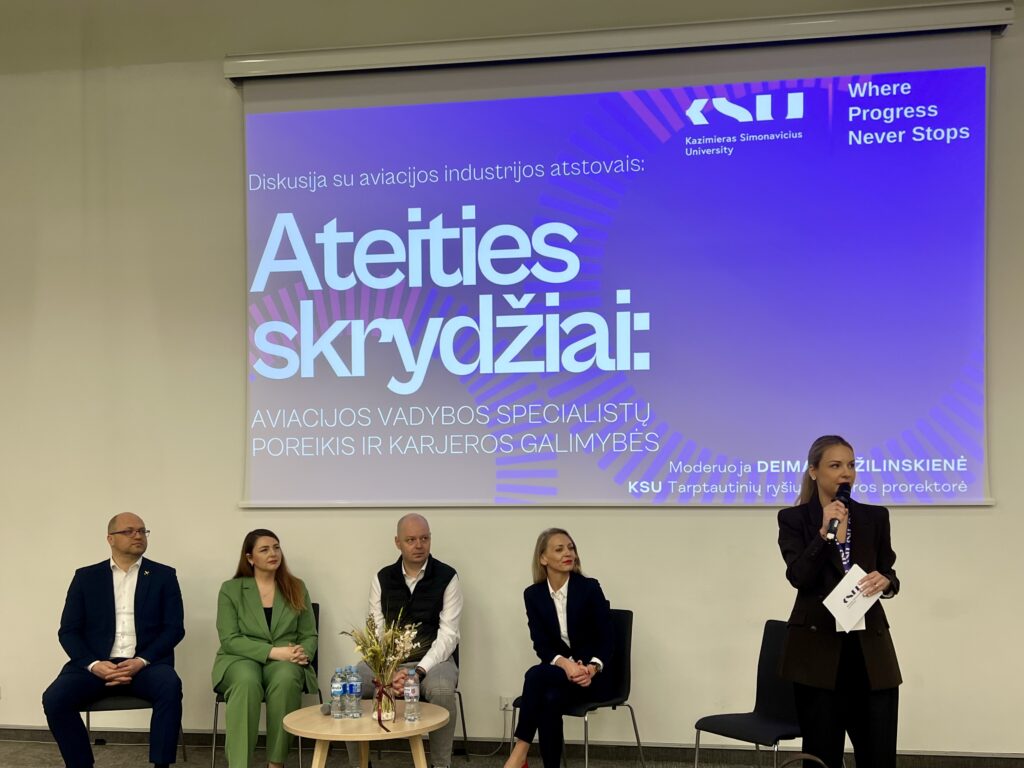
Aviation in Lithuania: Stronger Than It Appears
While Lithuania may not have a national airline, its aviation sector is thriving.
“Lithuanian-owned aviation companies generate around €1.3 billion in GDP annually – over €4 billion globally – and operate in 25 countries,” said Aleksandras Nemunaitis, Chair of the National Aviation Association (LAVIA).
With 6,000–7,000 professionals (excluding flight crew) working across fields like marketing, finance, engineering, HR, legal, and IT, Lithuania is especially strong in aircraft leasing, maintenance, drone technologies, and aviation training. Many local graduates go on to work successfully abroad, thanks to globally aligned education standards.
Precision in the Sky: Lithuanian Excellence in Business Aviation
KlasJet, a Lithuanian capital company, has made a name for itself globally in the VIP and charter flight market.
“Our leased aircraft offer exceptional service tailored to individual needs – from business clients to national delegations,” shared Sandra Diaso, Head of HR at KlasJet.
Aviation Meets Innovation
Though aviation may appear cutting-edge, it remains conservative at its core due to strict safety regulations. This, according to Julius Norkūnas (CEO of Digital Aero Technologies & Aeroclass.org), creates space for bold innovation.
“There are no borders in aviation – the language is English, and the standards are universal, whether you work in Saudi Arabia or Lithuania,” he said.
Norkūnas highlighted Aeroclass, a platform offering online aviation training to professionals from across the globe, proving that aviation careers can be pursued internationally – even without leaving home.
“Forecasts predict that the number of air travellers will double over the next 20 years,” he added. “That means new roles and specialisations are on the horizon.”
A Growing Sector Needs Bright Minds
Inga Duglas, Chair of the Civil Aviation Association (CAVIA), emphasised the growing need for innovation in areas like airport infrastructure, logistics, and hydrogen-powered aircraft.
“The need for skilled professionals will only increase. While aviation is heavily regulated, it thrives on innovation,” she said.
Not Just for Engineers: A Sector for All Talents
Whether your strengths lie in humanities, social sciences, or engineering, there’s a place for you in aviation.
“From commercial roles to aircraft maintenance, the industry needs both technical knowledge and soft skills,” noted Duglas.
“It’s a fast-moving, international, and rewarding sector,” added Sandra Diaso. “Education is important, but personal qualities and adaptability matter just as much.”
Real Careers, Real Students
Deimantė Žilinskienė, KSU Vice-Rector for International Relations and Development, closed the discussion by highlighting real student outcomes.
“We get calls from aviation partners every week, looking for interns or employees – in Lithuania and beyond.”
At KSU, many Aviation Management students are employed before they graduate, proving the sector’s openness to new talent.
“Before choosing your degree, ask yourself if aviation truly excites you. If it does – choose the path where you see your future. This is the perfect field for blending theory with hands-on global experience,” she said.
Kazimieras Simonavičius University (KSU) has become a member of the International Association for Management Development in Dynamic Societies (CEEMAN). 
According to Deimantė Žilinskienė, Vice-Rector for International Relations and Development at KSU, membership in CEEMAN presents an excellent opportunity for the university to join this international academic community and further enhance the quality of its activities.
“Membership in this organisation offers the university numerous advantages. Most importantly, it provides access to a strong international network where experience, knowledge, and solutions to pressing issues are shared. It’s not just about networking – it also opens the door to collaboration opportunities, allowing for the implementation of joint projects, research, or exchange programmes in management, business, and other fields of study and research,” says the Vice-Rector.
She adds that CEEMAN membership will play a significant role in the development of KSU’s School of Business Innovation and Communication. “CEEMAN promotes the integration of innovation in the study process and strengthens ties between academia and business – enabling business and management study programmes to better respond to labour market needs. This aim is one of our university’s key priorities,” states Vice-Rector Žilinskienė.
The association also offers a variety of training programmes, seminars, and conferences designed for the professional development of lecturers and managers.
“Members of the association have access to CEEMAN publications and research reports, gain visibility on the international stage, may nominate their staff for awards, and pursue International Quality Accreditation (IQA), which confirms that an institution meets high standards in business and management education,” emphasises Deimantė Žilinskienė.
According to her, the benefits provided by membership in the association will not only help strengthen the university’s name and expansion internationally but will also contribute to the development of higher-quality and more modern management education. “We are delighted to have become CEEMAN members, as it is both a great recognition for the university and a step forward in enhancing our internationalisation efforts,” says Vice-Rector Žilinskienė.
Established in 1993, the association seeks to accelerate the improvement of management quality in Central and Eastern Europe. Today, it operates as a global network of institutions that foster excellence in management education and the dissemination of knowledge.
CEEMAN currently comprises 230 members from 55 countries across Europe, North America, Latin America, Africa, and Asia.
Kazimieras Simonavičius University (KSU) is set to launch a Bachelor’s degree programme in Cinema Industry Management from 1 September. Early admission for this programme is already open.
The film industry is a branch of the creative industries that encompasses a wide range of fields, including cinema, animation, advertising production, specialised equipment rental, casting, set and prop design, video and audio post-production, film distribution, and other audiovisual-related services. Research and innovation also play a crucial role in this industry.
According to KSU Rector Dr Gitana Neverienė, the university is committed to offering programmes that align with current and future labour market needs. She highlights the global film industry as a rapidly growing and highly promising field.
“The industry is growing rapidly, with global revenues expected to surpass pre-pandemic levels, ensuring a demand for skilled professionals. Students should consider studying film industry management in Lithuania because the country has a rapidly growing film sector with increasing international collaborations and government incentives for filmmakers. The country has become a popular filming destination for global productions, providing students with real-world exposure to international projects. Additionally, Lithuania’s strategic location in Europe allows easy networking with major film markets, opening doors to global career opportunities. With affordable tuition and a vibrant creative community, Lithuania is an excellent choice for aspiring film industry professionals”, says the Rector.
The programme curriculum includes courses covering film production and project management, scriptwriting, financial planning, marketing and distribution, legal aspects of the film industry, digital innovations, film festival organisation, and more.
The Bachelor’s in Cinema Industry Management will take 3.5 years to complete, and students will have the option to study in Lithuanian or English.
For more information about the Bachelor’s programme in Cinema Industry Management, click here.
Additionally, from September, KSU is also inviting students to enrol in its newly launched programmes: a Master’s in Fashion Management and a Bachelor’s in Contemporary Communication and Media.
From 27 February to 2 March, the Vilnius Book Fair will take place at the Litexpo Exhibition and Congress Centre, where Dr Helga M. Kauzonė, Vice-Rector for Research at Kazimieras Simonavičius University (KSU), will present her second book, Slow Spring.
A PhD holder in Technology Sciences, Dr Kauzonė is widely recognised as a talented leader. However, she surprised colleagues and friends by embracing a new role—that of a writer, a passion she now considers an important part of her life.
Ahead of the Book Fair, Dr Kauzonė shared her thoughts on writing, creativity, and her latest work.
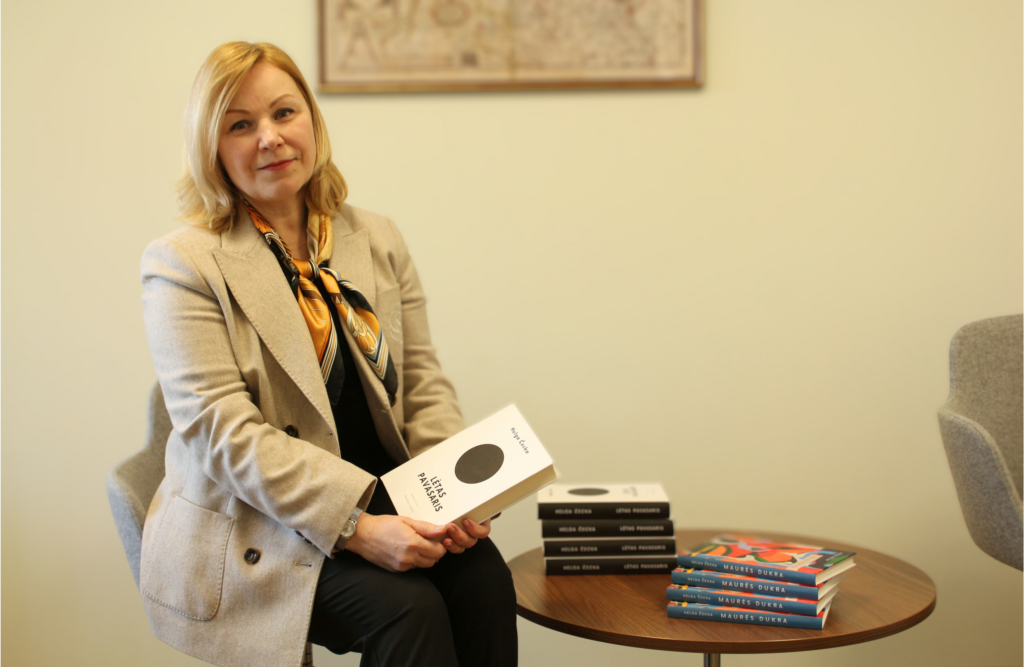
– Your second book, Slow Spring, will be presented at the Book Fair. What is it about?
– Let’s leave that discovery to the readers. I can reveal, however, that this is not a story about spring in the literal sense—it is a metaphor, a state of being experienced by both the protagonist and the reader throughout this psychological drama. At its core is a young woman whose life experiences and emotions are inspired by true stories.
This book is more mature, and I would even say, bolder than my first. I believe readers will recognise familiar emotions and situations, making it a relatable and relevant read.
– You hold a PhD and have spent many years in leadership roles in the public sector. What led you to start writing?
– I published my first book in 2015. I began writing because I felt trapped in routine and realised I needed a change. Writing became my escape into another world. I remember the exact day I came home and started putting my thoughts on paper—that was the beginning of my writing journey.
Interestingly, I didn’t start my first book on a computer but wrote it by hand. Perhaps that was my way of distinguishing creative writing from the professional and academic writing I was accustomed to.
– How would you describe your writing style? Do you feel you have a signature genre?
– I don’t confine myself to a single genre—just like in research, I enjoy experimenting. Each book is a new exploration, a fresh experiment.
My first book was in the science fiction genre, which required deep research into Einstein’s personality, historical context, and character development. In contrast, Slow Spring delves into psychological drama, exploring raw emotions and human experiences. Most recently, I have completed a detective novel that incorporates elements of haiku poetry.
For me, the genre is secondary—what matters most is the ability to explore different themes and craft compelling narratives. Writing, for me, is the ultimate liberation of the imagination.
– How has your family responded to your writing career?
– They have been incredibly supportive, which means the world to me.
– What does it feel like to complete a book?
– It’s an incredible feeling!
And almost immediately, I start planning my next “escape”—writing another book. Even as I was finishing my first book, I had already begun thinking about the second.
By the way, while Slow Spring is my second published book, it is not my latest work. I have already completed another manuscript, and I look forward to sharing it with readers in the near future.
– How does your academic experience influence your writing?
– Writing a dissertation and writing a book are two completely different endeavours, yet both require the same key qualities—consistency, patience, and a clear logical structure.
– Did you follow a structured writing plan?
– I intended to, but reality had other plans. I wrote on airplanes, during business trips, in the car (using a voice recorder), and sometimes my characters would wake me in the middle of the night. It was an immersive and thoroughly enjoyable process.
– Do you write for yourself or for others?
– I begin writing for myself, but as the story unfolds, I realise I have something meaningful to share with others.
– What advice would you give to those who dream of writing but hesitate to start?
– If you feel you have a story to tell, don’t hesitate—just start writing. Don’t hold yourself back. But be mindful that, no matter how exciting it may seem, writing is hard work. Translating thoughts into words is far more challenging than it appears.
Deimantė Žilinskienė has been appointed as the new Vice-Rector for International Relations and Development, effective 24 February 2025. Prior to this role, she successfully led the School of Business Innovation and Communication.
 In her new position, Ms Žilinskienė will represent the university in both national and international organisations, drive the expansion of KSU’s global partnerships, foster relationships with institutions across Lithuania and abroad, develop strategic growth projects, and coordinate the activities of the university’s Senate.
In her new position, Ms Žilinskienė will represent the university in both national and international organisations, drive the expansion of KSU’s global partnerships, foster relationships with institutions across Lithuania and abroad, develop strategic growth projects, and coordinate the activities of the university’s Senate.
Speaking about her appointment, Žilinskienė expressed her enthusiasm for this new chapter: “I am honoured to take on this role, which is both a recognition of my longstanding work at KSU and a significant responsibility. Strengthening the university’s international connections is not just a professional challenge but a meaningful mission. I look forward to working with our committed academic community and exploring new opportunities that will further enhance KSU’s global presence and achievements.
I would also like to extend my gratitude to my colleagues, students, alumni, and social partners from the School of Business Innovation and Communication—your dedication has been an inspiration, and I am delighted that we can continue to collaborate in new areas.”
Žilinskienė has been a part of KSU since 2017, serving as Head of the School of Business Innovation and Communication, a lecturer, and a member of the University Senate. During her tenure, she and her team successfully developed and implemented bachelor’s and master’s degree programmes in business, management, and communication, all of which have been accredited for the maximum period of seven years.
Her professional expertise extends beyond academia—she is an expert at the Lithuanian Standardisation Department and a board member of the National Aviation Association (LAVIA). She has also worked in higher education analysis and management at the Government Strategic Analysis Centre (STRATA) and Mykolas Romeris University.
A recognised researcher, Deimantė Žilinskienė is the co-author of three academic books and has published research in both national and international journals. She is an active participant in international scientific conferences and has contributed to numerous global projects related to ICT, gamification, entrepreneurship, and aviation management.
Holding a master’s degree in public administration from Mykolas Romeris University, she is currently pursuing a PhD in management sciences, focusing on open innovation, education management and analytics, and public-private sector innovation.
Ms Žilinskienė joins a newly structured KSU leadership team, which recently welcomed Dr Helga M. Kauzonė as Vice-Rector for Research and Dr Lidija Kraujalienė as Vice-Rector for Studies.